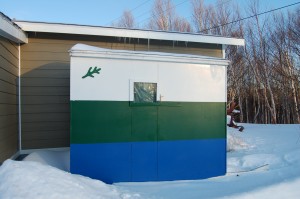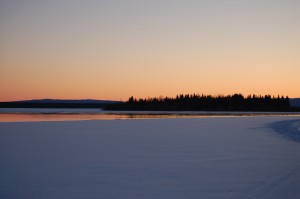Building rapport with research
Posted in anthropology, Labrador, research on March 19th, 2011 by Emily S. Channell-JusticeI returned from my travels at the end of February. It has taken me almost the entire month of March to readjust to the life of a student (as well as to non-freezing temperatures), but I finally feel ready to share a little bit about my experience and the post-return processing I’ve been doing. Not many graduate students get the opportunity to do research in their second year of work, if they ever get such a chance. While to some, it might seem useless to go to a place where I don’t want to focus my dissertation, I learned many valuable lessons about research in general. This is a tremendous insight for me to have, because it’s one of those aspects of being in academia that no one ever really tells you about. All the methods classes and mini-ethnographies in the world can’t actually place you in a funded, rigorous research setting in which the work has real impact on multiple levels.
The project I worked on in Canada is a social networks analysis of people’s connections to one another. In the two weeks I was there, I did nearly 50 interviews with people from all walks of life, some with lots to say and some with nothing to say. Spending 30 minutes in a room with a stranger who you, as researcher, have decided has something to say is an incredibly useful skill to develop. Many of the people we interviewed were a bit flabbergasted that anyone, especially a bunch of New Yorkers, would care at all about what they had to say. And some of them didn’t really have much to say. Here is the value in doing such a huge number of interviews: while there certainly are people who don’t share a lot of information, more people, who might shy away from interviews because they think their opinion is insignificant, actually have a lot to say if you can figure out how to get them to open up. We call it “building rapport” in anthropology, and it’s one of those things that you develop in a context like this one. Our interviews used the same form each time, but the best interviews weren’t from the people whose answers filled in the boxes best. They were the ones who told me a little about themselves, and then I picked up on something to get them to open up. Then, you’re just having a conversation.
Those conversations are the spaces in which your ideas about a place develop. Doing research for someone else’s project, I don’t get much say in the direction of the work. But some of my better interviews showed me that sometimes, asking the same structured questions over and over aren’t actually going to get you anywhere, even if that’s “the project.” Part of doing research is allowing the research to do itself: why force someone to tell you who they drink with when what they really want to tell you is how they stopped drinking, got out of their bad relationship, and are now bringing up their daughter and taking care of their mother? Sometimes, it’s better to know how to maneuver a question to get someone to talk rather than how to utter a series of words so that you get an answer. That is when you actually learn something. And no one ever tells you that in class.
While developing interviewing skills was a big part of the trip, simply being in a small town as a researcher is itself an experience. Going to the grocery store and seeing people you interviewed is itself a unique part of research. Setting aside your critical mind to go skiing or explore the country a little is also part of research, even if you’re in a place you already know. And for someone like me, who wants to do research in the place she came from, this could prove to be particularly interesting. How are things there going to seem different when I’m looking at them through the eyes of a researcher? What kind of relationships will I build with people there?
It’s important to note that I struggled with adopting the researcher’s eyes. No matter how “postcolonial” anthropology may think itself, the work that we do is still skewed by our interests, and we impose those interests where we do research. The questions we ask out interlocutors are informed by our biases, and learning how to ask questions better once you’re sitting across a table from someone doesn’t change the fact that the questions often don’t make sense to them and they way they live. Questions about traditions and customs are second nature to anthropologists, but when was the last time we thought of our lives in those terms? I enjoyed working as a researcher, and I’m looking forward to doing more of it in the future, but I’m also still coming to terms with what that means. I hope that most young anthropologists think about this process, though: we can’t just put on our researcher suits and churn out knowledge. Becoming a good researcher is a complex process, and it takes a lot of self-inquiry. I can’t say that one project has gotten me there, but I think I’m off to a good start.



